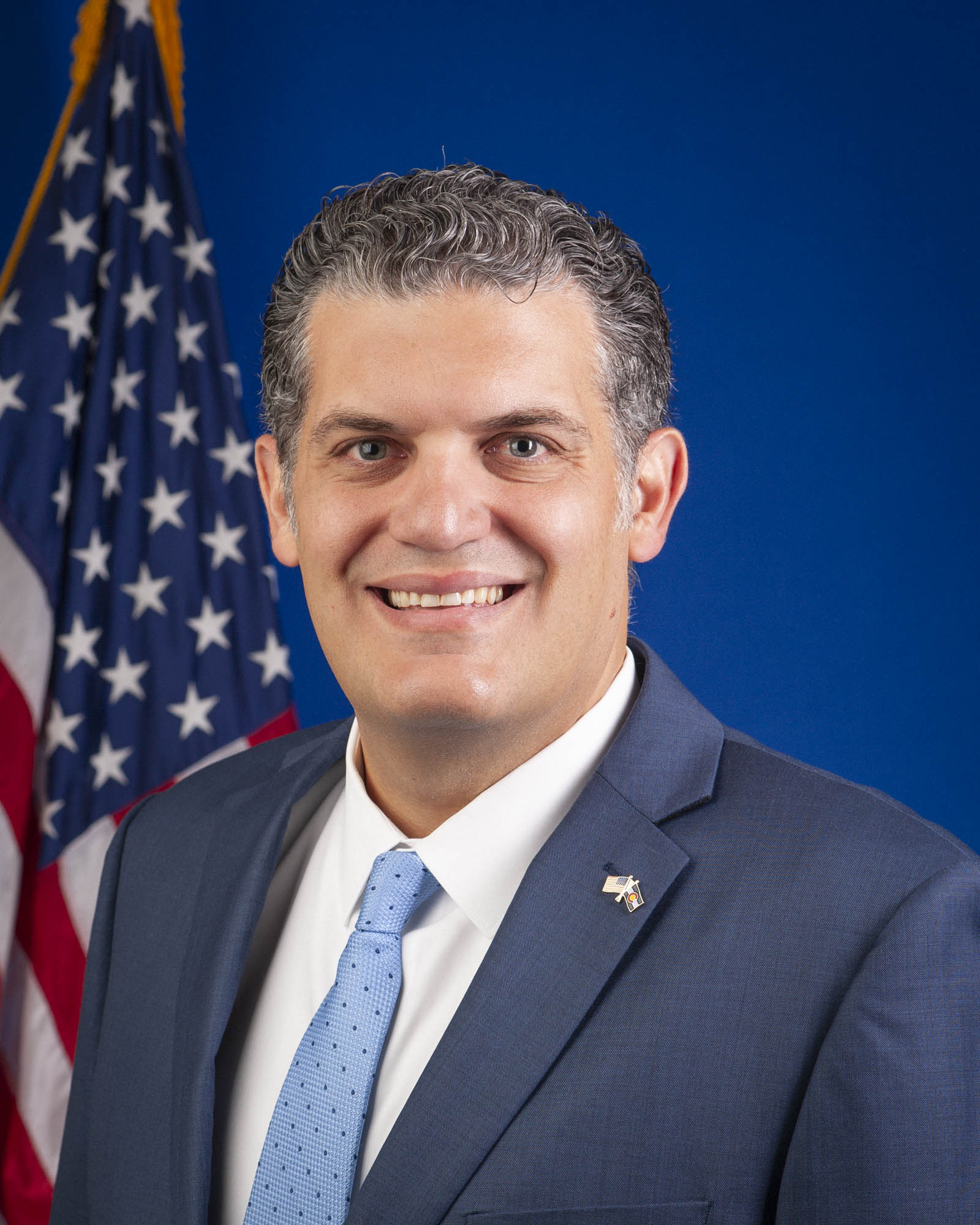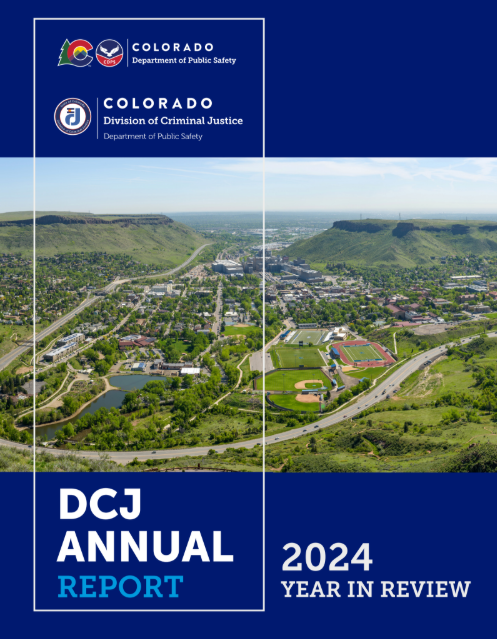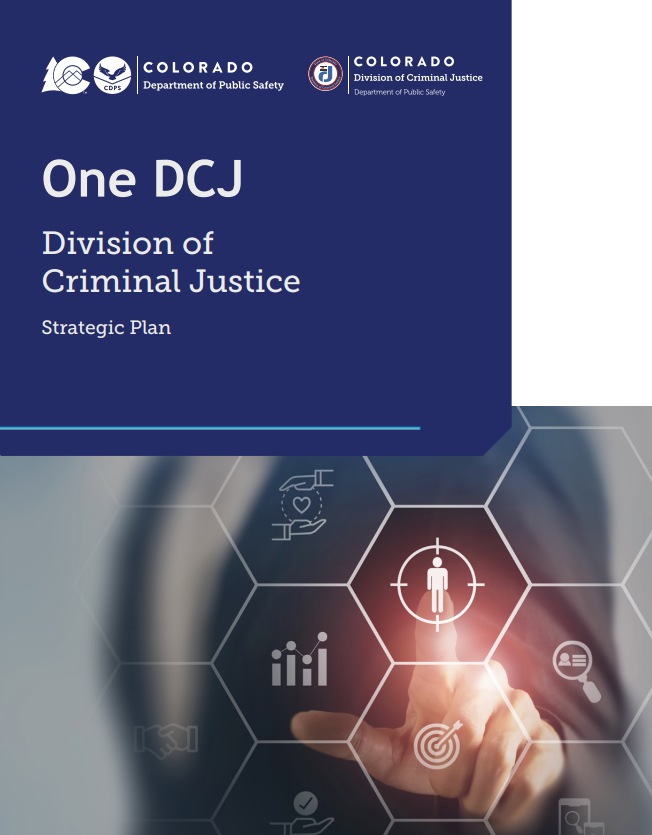About the Colorado Division of Criminal Justice
One Mission. One Future. One DCJ.
The Colorado legislature created the Division of Criminal Justice (DCJ) to "...improve all areas of the administration of criminal justice in Colorado, both immediately and in the long term, regardless of whether the direct responsibility for action lies at the state level or with the many units of local government" (24-33.5-501 C.R.S. 1973 as amended).
The Division of Criminal Justice plays a vital role in creating safer communities for all who call Colorado home. At its core, DCJ works to improve the safety of the community, the quality of services to crime victims, and the effectiveness of services to offenders to create meaningful, and sustainable long-lasting solutions. This is accomplished by analyzing policy, conducting criminal justice research, managing programs, and administering grants.
The Foundation of Our Strategic Plan
- Pillar 1: Elevating and Being Responsive to All who Call Colorado Home
Objective 1.1: Collect actionable data on critical public safety issues and use data-driven decision making to implement policies and practices.
- Measure 1.1.1: Track community corrections acceptance rates by judicial district.
- Measure 1.1.2: Analyze law enforcement contact data.
Objective 1.2: Increase engagement with under-served communities.
- Measure 1.2.1: Number of training and technical assistance contacts provided.
- Measure 1.2.2: Number of new grant applicants from support areas or jurisdictions not previously funded.
- Measure 1.2.3: After a review and update to the DCJ’s grantee risk assessment and monitoring process, report out survey results from impacted communities.
Objective 1.3: Enhancement of Board member recruitment and development efforts.
- Measure 1.3.1: Track organization types of representative board members and seek representation from all of the needed communities and organizations in Colorado.
- Measure 1.3.2: Track the numbers and types of training offered to the DCJ’s boards and commissions.
- Measure 1.3.3: Develop mentorship and coaching programs to enable access and special training opportunities related to leadership, governance, and service.
- Pillar 2: Recruitment and Retention of Staff
Objective 2.1: Develop a centralized resource hub for DCJ staff development.
- Measure 2.1.1: Publication of the resource hub and track the number of training and professional development resources offered.
- Measure 2.1.2: Track the number of staff who participated in professional development opportunities.
- Measure 2.1.3: Develop DCJ staff member career roadmaps as part of the annual performance review process.
Objective 2.2: Improve staff recruitment efforts including efforts towards achieving an inclusive DCJ staff where all communities are represented by developing college recruitment outreach, decreasing barriers to employment for those with lived experience, and developing a culture guide for Offices and DCJ including the use of story telling.
- Measure 2.2.1: Publication of a “This is DCJ” video.
- Measure 2.2.2: Launch DCJ recruitment campaign.
- Measure 2.2.3: Track the number of applications including demographic information for the DCJ employment opportunities.
Objective 2.3: Improve onboarding process for new DCJ staff.
- Measure 2.3.1: Publish a division-wide onboarding plan that offices can add their own unique content to.
- Measure 2.3.2: Create an onboarding survey for new staff to complete within a few months of their start date to determine any gaps in the onboarding plan.
Objective 2.4: Create a DCJ culture of community, inclusion, and belonging, and support work/life balance.
- Measure 2.4.1: Develop, deploy, and make available retention survey data.
- Measure 2.4.2: Improve/Standardize the offboarding process for staff that leave DCJ including the process for scheduling exit interviews with DCJ Director/Deputy Director.
- Pillar 3: Enhancing Collaboration in Public Safety
Objective 3.1: Increase collaboration with stakeholders to improve efficiencies and access to DCJ services including information sharing sessions, listening sessions, and developing emerging leaders.
- Measure 3.1.1: Develop and initiate focus groups with community partners to gather feedback about DCJ services/programming.
Objective 3.2: Enhance DCJ’s image in the community.
- Measure 3.2.1: Track followers and engagement with our social media platforms, website, and newsletters.
- Measure 3.2.2: Track the number of proactive media engagements.
Objective 3.3: Increase cross-office collaboration through such mechanisms as joint office meetings and cross-office position-specific meetings.
- Measure 3.3.1: Track the number of cross-office collaborations.
-
Foster Belonging, Inclusion, and Transparency -
Collaborate and Communicate-- Inside and Out -
Lead with Evidence and Innovation -
Streamline Workflows for Consistency and Clarity
Leadership

Matt Lunn
DIRECTOR
Dr. Matthew M. Lunn was appointed as the director of the Division of Criminal Justice in September 2023. Prior to his appointment, Dr. Lunn was the Director of Strategic Initiatives at the Denver Police Department where he focused on public policy, developed short- and long-term strategic goals, drove innovation and evaluation efforts, and maximized organizational efficiency and effectiveness. Prior to his tenure with the Denver Police Department, he worked for the Arapahoe County Coroner's Office and for the Iowa Office of the State Medical Examiner.
Dr. Lunn earned his Ph.D. from the University of Colorado Colorado Springs, a Master of Science from Regis University, and a Bachelor of Science from Iowa State University. Lunn is a graduate of the Senior Executives in State and Local Government program from the John F. Kennedy School of Government at Harvard University and the Police Executive Research Forum's Senior Management Institute for Police. Dr. Lunn held leadership roles on local, state, and federal boards and commissions, and held faculty appointments at the University of Colorado Colorado Springs, University of Colorado Denver, and Binghamton University-SUNY. Lunn is currently serving on the board of directors for the National Criminal Justice Association.

Christopher Lobanov-Rostovsky
DEPUTY DIRECTOR
chris.lobanov-rostovsky@state.co.us
Christopher Lobanov-Rostovsky was appointed as the deputy director of the Division of Criminal Justice in August 2024. Prior to his appointment, Mr. Lobanov-Rostovsky worked as the Program Manager for the Office of Domestic Violence and Sex Offender Management since 2006, where he was responsible for overseeing the work of the Sex Offender Management Board and Domestic Violence Offender Management Board. Prior to working for the Division of Criminal Justice, Mr. Lobanov-Rostovsky worked as a clinician working with clients involved in the criminal justice system either as the perpetrator or victim of sexual crimes.
Mr. Lobanov-Rostovsky holds a Master Degree in Social Work from the University of Michigan, and has been a Licensed Clinical Social Worker (LCSW) since 1990. Mr. Lobanov-Rostovsky also provides training and technical assistance for a variety of federal, state, tribal, and private agencies to develop and enhance policies and practices. Mr. Lobanov-Rostovsky was a co-project consultant lead for the U.S. SMART Office’s Sex Offender Management Assessment and Planning Initiative (SOMAPI) to identify research supported sex offender management and treatment policies and practices. Further, Mr. Lobanov-Rostovsky has published a number of journal articles and book chapters related to federal and state sex offender management public policy. Finally, he was awarded the 2015 National Adolescent Perpetration Network Advocacy Award for his work in promoting evidence-based polices and legislation.


